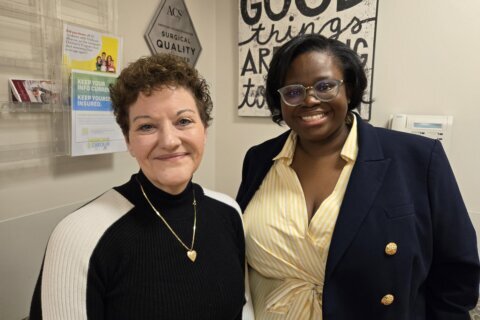The recent suicides of the mayor of Hyattsville, Maryland, and a former Miss USA in New York can affect even people who didn’t know them well.
In the immediate aftermath of a suicide, there is a higher risk of other suicides among people who might need support, according to a Northern Virginia psychiatrist.
“And also in a more long-term perspective, survivors of suicide loss are at higher risk for other mental health challenges, whether that may be post-traumatic stress, depression or even a higher risk of suicide much later on in life,” said Dr. Ross Goodwin, a psychiatrist at Kaiser Permanente in Burke, Virginia.
“It’s important to recognize that many different people with relationships to the person who died of suicide — or maybe people who may not have had a direct relationship with that person but who is still exposed to the suicide — is considered a survivor of suicide loss,” Goodwin said, “and someone who is perhaps at higher risk in the aftermath of suicide and someone who’s in need of contact or support after a suicide.”
Signs that survivors of suicide loss might need to seek help for themselves can include:
- Feeling increasingly depressed.
- Changes to sleeping or eating habits.
- Symptoms of post-traumatic stress, experiencing flashbacks or avoiding cues or triggers that can be reminders of the trauma they experienced.
- Feeling a physical sense of hyperactivation, such as being keyed up or on edge.
- Experiencing thoughts about suicide or planning suicide.
“Increased drug or alcohol use is a reason to consider getting more help as a survivor of suicide loss, or any kind of problem with grief,” Goodwin said. “Grief is normal and natural. But if it’s getting stuck, or you’re having problems navigating relationships with your family and friends, as a result of surviving the suicide loss, those are some reasons to seek out more support.”
Goodwin said seeking support can include individual counseling or support groups. Some groups meet online and are available virtually.
“Group support is a really good way of having some safe and open environment for a survivor of suicide loss to find some healing and some connection with others who may have experienced a similar loss,” Goodwin said.
If you suspect someone might be contemplating harming themselves, Goodwin said, you have to discuss it.
“It’s important to talk about it,” he said. “You’re not putting them at more risk for talking about it; you’re helping them by being direct and clear in your communication.”
As for what he means about being direct?
“It means asking specifically … ‘Are you having thoughts of ending your own life or harming yourself? How are you doing?’ Checking in often and directly so that the person knows you care and to be able to elicit those thoughts and worries from a person, because if you don’t ask, you’re not going to hear about it,” Goodwin said.
Caring observers can help connect a person contemplating self-harm with professional help, to connect with a therapist, or the person’s primary-care physician.
“Or if you don’t have any other option, just connect with professional help and maintain that contact. Continue to check on the person and monitor over time and monitor for changes in those warning signs,” Goodwin said.
Anyone who is in crisis — or looking to help someone else — can call the National Suicide Prevention Lifeline 24/7 at 800-273-8255 (TALK).
Free trained crisis counselors also are available via text 24/7. Text the word HELLO to 741-741.
Starting July 16, everyone across the United States will be able to connect to the National Suicide Prevention Lifeline by dialing 988.








